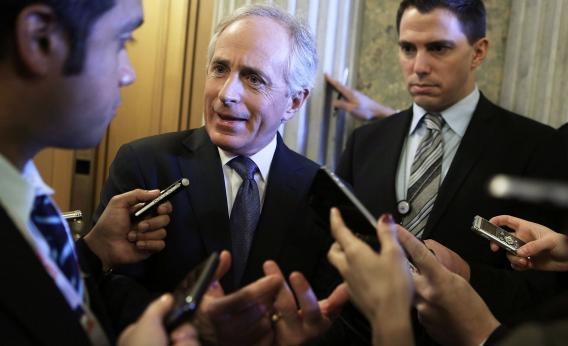Though no one much noticed amid the debate over whether the CIA or the Pentagon should be in charge of drone strikes, last week the Senate Foreign Relations Committee heard testimony on the need for a new and improved law authorizing the president to use lethal force against a new and changeable set of terrorist groups. This week, Republican Sen. Bob Corker of Tennessee announced plans to introduce legislation that does just that. The idea is that now the war against al-Qaida is nearly won, it may be time to declare war anew, this time against one or more of a score of emerging radical Islamist groups who were “inspired” by some part of al-Qaida’s message.
It is not clear exactly which new threat or threats are driving the call for new authority to use military force. In his testimony, former National Counterterrorism Center director Michael Leiter embraced the growing consensus that the al-Qaida that attacked us on 9/11 is, in his words, “a shadow of its former self.” He likewise warned against overreaction to the attack on the U.S. consulate in Benghazi or the threat to the United States posed by al-Qaida in the Islamic Magreb (AQIM), a group far “less tactically proficient and more regionally focused” than the al-Qaida of 9/11. More troubling in his estimate is Jabhat al-Nusra, a militant Syrian group now a magnet for radical Islamists to join the already bloody conflict in that country. Yet Leiter stopped short of calling for the United States to use force against al-Nusra and floated the idea of stepping up aid in the region but not drone strikes against al-Nusra targets in Syria or Iraq. In the meantime, echoing the views of former Defense Department general counsel Jeh Johnson, Leiter indicated that the existing authorization to use force against al-Qaida and its associates—passed by Congress in 2001 and still on the books today—allowed for every use of counterterrorism force that was required during his tenure in government.
Despite this, Leiter and others seem convinced that Congress should pass a new law authorizing force. Strangely, these calls for Congress to delegate new power to the executive branch seem animated less by an articulated security strategy or identified target than by a sense that this will actually help constrain the use of presidential power. As the argument goes, the president—any president—will want the option at some point of using force against some terrorist group. If Congress legislates, it can establish limits on the scope of the president’s authority by setting the rules for him to exercise it.
The search for meaningful constraints on power is indeed the central challenge of our constitutional system. But Congress has an abysmal track record of successfully reining in presidential uses of force overseas. And there is little cause for hope it will succeed here. Consider the recent history. Congress decided in the days after 9/11 to authorize the use of force against a limited set of targets responsible for the attacks of 9/11, and two presidents have now used that authority to its fullest. But such broad congressional authority has not stopped President Obama, just like his predecessors, from asserting that he retains inherent authority to use force in self-defense under Article II of the Constitution, above and beyond what Congress authorizes. Congress can authorize whatever new wars it wishes; the president can still use force against imminent threats without it.
This is hardly to say the president’s decision to use force operates under no constraint at all. Using force is expensive, it is alienating, it is provocative, and it may create greater threats to the American people than it prevents. Presidents have to convince the American public that war is worth fighting. This has even been true when they respond to acts of terror in self-defense. When President Reagan ordered strikes against Libya following the bombing of the civilian airliner over Lockerbie, Scotland, he made a speech from the Oval Office. Ditto for President Clinton when he bombed Sudan in response to al-Qaida’s attacks on the U.S. Embassies in Kenya and Tanzania. Mission details were rightly few, but both presidents explained who we had targeted and why. And the public, if they were displeased, could hold accountable the president or his party.
Today, it is this lack of transparency—not Congress’ relative apathy—that has boosted executive power and threatened the legitimacy of current drone operations. If Congress wants to do something about this, it should start by beefing up its own oversight efforts. Current federal laws require the president to notify the intelligence committees of all covert actions carried out by CIA (after the fact if need be). Congress should also require the same degree of notification of the Senate and House Armed Services Committees for operations carried out by the military’s Joint Special Operations Command, an active participant in U.S. targeting operations. The much maligned War Powers Resolution has been modestly effective in requiring the White House to report the introduction of military forces into hostilities. In the age of drones, Congress should explore strengthening that reporting requirement further.
If a terrorist group poses a threat to the United States that is truly imminent, the president of course retains his power to respond with force in self-defense. If and when a new terrorist group emerges that poses the kind of profound threat to the American people al-Qaida posed in the years leading up to 9/11, the president should seek authorization from Congress to use force against that group. New authority to use force is unlikely to diminish the president’s power. Neither does it ensure the public will be told who the United States attacks or why. Absent either, the case for new use-of-force legislation is impossibly thin.
